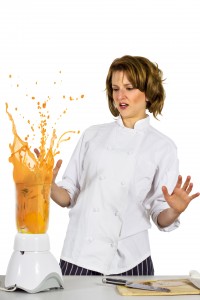
Sitting at a nice restaurant is usually a calm, comfortable experience: the talk is friendly, the lighting is ambient, the bread is warm, and the servers are charming and composed. But through that swinging kitchen door is a hectic and dangerous environment. With the number of workers dashing around a cluttered room full of hot stoves, sharp utensils, and slippery fluids, very few restaurant kitchens can claim to be accident-free.
These accidents range from slightly irritating to hilariously clumsy to seriously crippling, and some can affect restaurant customers as well as workers. Watch this restaurant accident caught on closed circuit video and try not to let this happen to you!
Accidents like that don’t happen too often. But here are the most common kitchen accidents and the best ways to prevent them.
- Sprains and strains: By far the most common kitchen injuries, these can result from falls, falling objects, and overexertion. Avoid falls by cleaning up restaurant spills as soon as they occur, wearing secure, no-slip footwear, drying the floor after mopping, keeping the floor clear of objects, and communicating with voice and/or touch when passing someone in a crowded kitchen. And avoid back strains by lifting heavy objects properly: lift with arms and legs, not back, and don’t pick up more than you can handle.
- Cuts: A deceiving fact about this second most common kitchen injury—dull knives actually cut more people than sharp ones. Give cooks the control and precision they need by keeping knives sharpened. Other knife safety tips include never grabbing a falling knife, never submerging knives in soapy water, never using an unsteady cutting board, never storing or drying knives blade-up, and holding food secure with knuckles (not fingertips) while cutting. That last tip is great for preventing BRIs (the official government acronym for Bagel Related Injuries). Also, be sure to train employees in slicer equipment safety.
- Burns: Deep fat fryers are the number one cause of kitchen burns, so everyone working on the line must be extra cautious: keep fryer equipment clean, maintain the proper levels and temperature, be conscious of and avoid splash back (lower the basket not the product), filter only at a safe temperature, and keep the floor around the fryer dry and grease free. Burns can result from stoves and ovens as well, so always use gloves and hot pads, keep a close eye on everything that’s cooking, and always have a fire extinguisher nearby.
- Broken dishes: Though most injuries resulting from broken dishes would fit the “Cuts” category, you need to take special precautions to prevent them. Any dish with even a small nick in it can be a hazard to both workers and customers, slicing through skin. Minimize dish breaks by handling dishes with care and storing the same dishes together. Glass is especially dangerous: store glass on its own, keep bar glasses away from ice bins, and throw away all cracked or broken glass in a broken glass bin (not the garbage!).
Taking the right precautions will minimize kitchen accidents, but it’s unlikely to eliminate them entirely. Having the right equipment on hand to handle these accidents can make a huge difference: equip your restaurant with first-aid kits, burn kits, fire extinguishers, cleaning supplies, sturdy cutting boards, cut and burn resistant gloves, knife covers, wet floor signs, and any other safety equipment you might use even once.
How to use this Information
As Denver’s top restaurant brokers, we take safety very seriously. Sure, it might be fun to joke around about chefs slipping on banana peels, but some kitchen accidents are life-changing and no laughing matter. Talk to Sanborn and Company, your Colorado restaurant brokers, about improving your business’s safety or browse our Colorado restaurants for sale or lease. Looking to buy or sell a business, give the experts at Sanborn a call at 303 220 7919 or inquire online.
Tell us any kitchen accidents you’ve seen or experienced, or share how you keep your kitchen safe!
